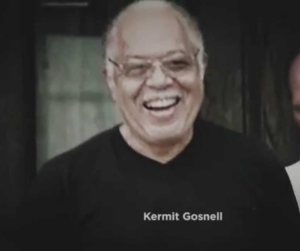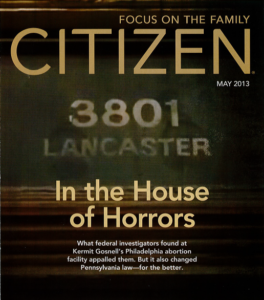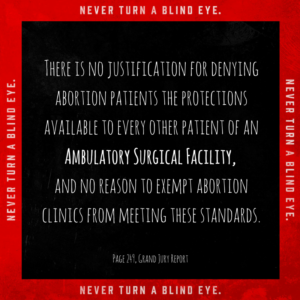PA Family Institute played a critical role in turning the tide for Pennsylvania to pass a law and fix some of the problems uncovered with Kermit Gosnell’s House of Horrors. The abortion industry did everything they could to stop it.
“There is no justification for denying abortion patients the protections available to every other patient of an ambulatory surgical facility, and no reason to exempt abortion clinics from meeting these standards.” Gosnell Grand Jury Report (Page 249)
 America’s biggest serial killer – Kermit Gosnell – not only showed the world how horrific abortion can be but also how extreme abortion businesses like Planned Parenthood truly are. The abortion industry – led by the largest abortion business of Planned Parenthood – attempt to stop any law that remotely relates to a limit on abortion, no matter how reasonable and needed that law may be. A prime example is what happened with Kermit Gosnell.
America’s biggest serial killer – Kermit Gosnell – not only showed the world how horrific abortion can be but also how extreme abortion businesses like Planned Parenthood truly are. The abortion industry – led by the largest abortion business of Planned Parenthood – attempt to stop any law that remotely relates to a limit on abortion, no matter how reasonable and needed that law may be. A prime example is what happened with Kermit Gosnell.
Gosnell, the former West Philadelphia “doctor” that killed countless babies and endangered women, was convicted of three counts of first-degree murder for the death of three babies that were born alive and killed. His crimes, once they finally were uncovered, sparked Pennsylvania to eventually pass a law that hopefully will stop another Gosnell “House of Horrors” from happening again.
The law now classifies abortion clinics as ambulatory surgical facilities – something the grand jury recommended. This classification makes all surgical abortion centers in Pennsylvania follow the same rules that every other surgical facility follows. These same health and safety regulations is what Planned Parenthood called “dangerous,” “burdensome” and “unnecessary” as they fought against its passage.
Mind you, this supposedly “unnecessary” law is what resulted in shutting down an abortion clinic in Harrisburg last year that failed a myriad of safety violations in it’s mandatory state inspection. Some of those violations were not having an RN on staff, failing to complete Child Protective Services background checks, failing to throw out expired material, and failing to secure drugs appropriately. “Unborn children are safer today,” commented PA Family Institute President Michael Geer after their license was revoked. “THANK YOU to all those who helped us pass SB732/HB974 (2011-2012)…Involved citizenship makes a difference, and saves lives.”
 This law was not automatic and almost didn’t happen. The story is one to recount, something columnist Matt Kaufman summarized in his featured article in Focus on the Family‘s Citizen Magazine, entitled “Shocked Into Action” (first published on April 16, 2013). Here’s most of that featured article:
This law was not automatic and almost didn’t happen. The story is one to recount, something columnist Matt Kaufman summarized in his featured article in Focus on the Family‘s Citizen Magazine, entitled “Shocked Into Action” (first published on April 16, 2013). Here’s most of that featured article:
###
See No Evil
Michael Geer knows the story well. A veteran family advocate, he has been president of the Pennsylvania Family Institute (PFI)-—the state’s family-policy council associated with Focus on the Family-—since 1989.
The trouble, Geer said, started when pro-life Gov. Bob Casey, a Democrat, was succeeded by two abortion-rights supporters: Gov. Tom Ridge, a Republican, and Ed Rendell, a Democrat. Between them, they occupied the governor’s mansion for most of the years between 1995 and 2011.
“In 15 years, not a single abortion clinic was inspected by the state,” Geer told Citizen. “That was a decision made at the highest levels of the Ridge and Rendell administrations.”
The grand jury report backs Geer up. It tells of how the health department under Ridge “decided, for political reasons, to stop inspecting abortion clinics at all,” holding that “inspections would be ‘putting up a barrier to women’ seeking abortions.”
 Likewise, the department’s senior counsel told the grand jury of a 1999 meeting where high-level officials refused to reinstate clinic inspections. “There was a concern that if they did these routine inspections, that they might find a lot of these facilities didn’t meet [the standards], and then there would be less abortion facilities, less access to women to have an abortion.”
Likewise, the department’s senior counsel told the grand jury of a 1999 meeting where high-level officials refused to reinstate clinic inspections. “There was a concern that if they did these routine inspections, that they might find a lot of these facilities didn’t meet [the standards], and then there would be less abortion facilities, less access to women to have an abortion.”
Thus, repeated complaints about Gosnell went unanswered. Even when the health department learned that a woman had died at his clinic in 2009, officials refused to investigate.
It wasn’t just state officials who looked the other way. The grand jury report says “some pro-choice and women’s health groups learned from Gosnell’s patients of their frightening experiences,” but didn’t contact officials.
In 2009, Gosnell applied for membership in the National Abortion Federation (NAF), a network of abortion clinics, and was rejected because of numerous violations of basic health and safety standards. Yet the NAF never reported those violations to authorities-—a failure the grand jury found ironic, given its “stated mission … to ensure safe, legal, and acceptable abortion care, and to promote health and justice for women.”
“The bureaucracy turned a blind eye to the abortion industry,” Geer said. “Officials completely abdicated their responsibilities. And the industry wasn’t going to police itself. Clearly something had to change.”
Business as Usual?
Then came the raid on Gosnell’s clinic. And then there was no way to turn a blind eye any longer.
New Pennsylvania Gov. Tom Corbett fired six officials whose neglect was cited in the grand jury’s report, including the acting secretary of the Department of State.
“This happened because people weren’t doing their jobs, plain and simple,” he said. Unlike some cases where government runs amok, he said, this was a case of “government not running at all.”
Corbett also ordered regulatory changes, including a requirement that freestanding abortion facilities be inspected annually, as well as being subject to random, unannounced inspections.
But since regulations and policies can change with governors, lasting reforms had to be written into laws as well. And that was a tougher task.
In the state House, a strong bill sponsored by Rep. Matt Baker, R-Wellsboro, emerged that would hold abortion facilities to the standards of ambulatory surgical centers-—from emergency equipment and hospital admitting privileges to safe room-to-room and building specs and fire-code compliance. It also locked in regular inspections, with at least one surprise visit per year. It set up a complaint hotline, requiring the state to investigate every call.
Perhaps most important, the House bill provided that clinics lose their licenses for violating other state laws-—including the 1989 Abortion Control Act (upheld by the U.S. Supreme Court in Planned Parenthood v. Casey), which requires a parent’s consent for a minor’s abortion, 24-hour waiting periods and informed consent.
In the Senate, however, a far weaker version emerged-—one that would do little to alter the state’s hands-off approach toward abortion facilities.
“It was just a pathetic bill,” Randall Wenger, PFI’s chief counsel, told Citizen. “In practice, it would have meant business as usual.”
Yet it looked like the Senate version might prevail. “The abortion industry was fighting back furiously, crying that they couldn’t be expected to meet the standards others met, that it would cost too much, be too much trouble,” Geer said. “They’ve got political connections, and some lawmakers weren’t inclined to rock the boat.”
PFI staffers were looking for a way to turn the tide. Ironically, though, they found that way when they weren’t even looking.
Expert Witness
Just days before the Senate bill was scheduled for hearings, Geer and Wenger attended a fundraising banquet for the Hope Center, a pro-life pregnancy resource center serving inner-city Philadelphia. There they met an OB-GYN, Dr. Joseph Castelli, who struck them as an ideal witness to the Senate.
“The way God worked was just amazing,” Wenger said. “Joe was the perfect person to testify. He had experience dealing with miscarriages, so he knew about dilation and extraction procedures”-—the same ones used in abortions.
“And he was willing to testify. A lot of physicians wouldn’t want to drop everything and do that, but he just felt God was calling him to it.”
Castelli, though he was on call all weekend, quickly cleared his schedule for Monday.
“I looked at [the House version]and thought it was a great bill,” he told Citizen. “It covers the same kinds of procedures that I do.
“So I took the day off, put on a jacket and tie and went to the Capitol. It was a daunting experience. I’d never been there before, much less to testify.”
Nervous or not, Castelli was a major hit.
“He just laid everything out in a compelling, common-sense way,” Geer said. “He explained why all the safety standards had to be in place.”
After the testimony, Sen. Bob Mensch, vice chairman of the public health and welfare committee, approached Castelli to follow up.
He kept asking me medically oriented questions,” Castelli said. “I could see how interested he was.”
Mensch would prove to be a key ally. “Up until that point he had nobody with medical credibility making the case for stronger legislation, like the House bill,” Wenger said. “Now he’d found that someone. That gave him the inspiration to work with us to get the job done.”
Castelli, for his part, learned something from the experience, too.
“One of Gosnell’s patients was sitting to my right, testifying to what she’d gone through,” he said. “She really opened my eyes to some of the barbaric things that were going on, and just how necessary these regulations are.”
In the end, the strong abortion-clinic regulations passed and Corbett signed them into law on Dec. 22, 2011. It didn’t take long for their impact to be felt.
Just since the law passed, the number of abortion clinics in Pennsylvania has dropped from 22 to 17, with several either being turned down for a license or pre-emptively going out of business.
“That’s no coincidence,” Wenger said. “We finally have a law with teeth in it.”
And the requirement for facilities to abide by the rest of the state’s pro-life laws-—at risk of losing their licenses-—means that, from now on, all of them will be under scrutiny.
Pennsylvania’s abortion laws are the third-best of all the states, according to Americans United for Life. Those laws include parental consent, informed consent, waiting periods and restrictions on abortion funding or advocacy, among other provisions.
All that, said Geer, translates to fewer abortions and more lives saved-—the lives of babies and mothers alike.
“We work and pray to end abortions in Pennsylvania and America,” he said. “In the meantime, we’re working to save every life we can-—and to hasten the day when all human life is protected and valued.
“May that day come soon.”
###
The Gosnell Movie is now in select theaters. For details, visit GosnellMovie.com. Once you see the movie, see the documentary that interviews the real people involved – including Gosnell. To watch the documentary and for more information, visit 3801Lancaster.com.


